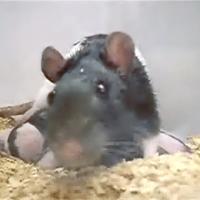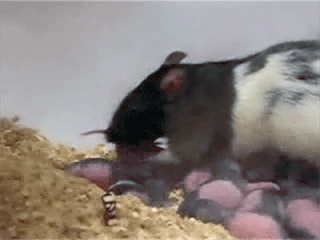
Jan 10, 2013
One of the most-asked questions after our Inheritance show had to do with our rat-licking segment.
In this ten-minute story -- part of our larger conversation on Lamarck -- researchers Michael Meaney and Frances Champagne spoke about maternal behavior in rats, and its effects on offspring.
As we reported, the duo's lab work shows that when a mother rat licks a pup (her sign of "I love you"*), the action sets off a Rube Golberg-esque cascade of hormones, which ultimately wind up all the way down at the level of the DNA.

What do those hormones do down there? It turns out, they change the chemical markers, or epigenome, surrounding certain areas of the DNA. And the end result of these changes hinges on how much the rat pup is licked: if a rat pup gets a lot of licks, the epigenetic changes cause the pup to grow up and lick its own kids a lot; if a pup doesn't get a lot of licks, the chemical changes cause that pup to be a low-licker. In both cases, the pattern of maternal behavior is carried across generations -- from grandmothers to mothers to grandkids. Or, in the words of Radiolab producer Soren Wheeler, "It's as if the epigenetic information leaps up out of the mother's genes through a tongue and lands back on the babies' genes." (Interested? Go listen to the show for more!)
BUT, but… many of our savviest listeners posed a follow-up question: how were the researchers sure that an epigenetic change triggered the offspring's maternal behavior, and not just a simple gene, passed on through the mother's lineage? Touché, my friends. It's a great question, and one we can answer -- the researchers tested your theory.
With different litters of rats, the researchers did some baby/mother rearranging (called "cross-fostering" studies). The experiment wasn't too complicated: within 12 hours of the pups being born, they took pups born of high-licking mothers and placed them with low-licking foster mothers, and vice versa (they took pups born of low-licking mothers and placed them with high-licking foster moms). And they controlled the experiment by making sure not to switch too many rat babies amongst the mothers -- they didn't want to scare the mothers or the babies into acting differently. So, once the rats were rearranged, they hung out in their new homes for one week, the normal time for a rat baby to stay in a nest. And though this whole paragraph reads like a bit of a tongue-twister, the end result was quite straightforward: the rats took on the characteristics expressed by their foster mother, not their biological mother.
The switching method also revealed proof of another connection. It turns out there's also an epigenetic link between maternal behavior and stress. The rats that were reared by high-licking mothers grew up to be less stressed as adults than those raised by low-licking mothers. They saw this was true for female pups as well as male pups; it wasn't just passed down the maternal line. And they saw that if they took babies from a low-stress mother and put them in a high-stress foster situation, the pup took on the characteristics of the mother rearing it. (The reverse was also true: pups born to high-stress moms but raised by low-stress ones turned out less stressed). According to the researchers' 1999 paper on the topic, "These findings suggest that individual differences in the expression of genes in brain regions that regulate stress activity can be transmitted from one generation to the next through behavior." Because that behavior causes an epigenetic change.
And while this all might sound a bit dreary -- your outlook on life and your own parenting is determined by how you are raised...something you don't have control over -- one bit of research made it seem quite uplifting to me: if the high-stress rats were put in a low-stress environment as adults (remember: in every other situation we're talking about rats that are one week old or less), epigenetic markers were still changed... resulting in a low-stress animal. Things aren't set in stone like they seem! And it pays to get a stress ball. Or, maybe, a rat.**
* Rats love on each other with licking, nuzzling, and grooming, as well as mothers laying on top of their pups in a sort of smother hug. The pup's fur is actually covered in salt, which a mother rat finds delicious. But for those of you who watched the video, you may wonder, what's with all that butt-licking? Turns out, a mother's licking not only results in some epigenetic tinkering, it's also critical to the rat pups health: a baby that is not licked would die (hence the scientists always talk about low-licking, not no-licking). Why? The licking activates specific body functions, that are key to life. That's right, you guessed it: Mama Rats must lick the babies' butts so they can poop.
** And for those of you that are inwardly grimacing at all this talk of rat love, Michael told me in a phone interview that despite how they are viewed, rats are actually VERY social creatures, and the ideal first pet for any family. What's that? Is that a new rat meme I'm sensing? LOLRats... I'll leave that to you.
*** Thanks to Frances Champagne for sharing some of her research footage of rat moms and pups, which we used with permission for the above image and GIF.